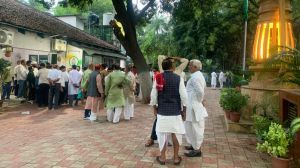My Life As A Comic Book
Umberto Eco’s sumptuous inquiry into how memory and identity are constructed can very easily be read as a whimsical memoir of his readi...

Umberto Eco’s sumptuous inquiry into how memory and identity are constructed can very easily be read as a whimsical memoir of his reading life. The novel opens with 59-year-old Giambattista Bodoni waking up in a hospital bed with no remembrance of who he is. All he has are copious references from literature. His doctor must acquaint him with his name, with the year he inhabits (1991, in the aftermath of the America-led invasion of Iraq), and his intelligent, dutiful wife, Paola, his city (Milan), and his thriving business as an antiquarian bookseller.
Bodoni, it transpires, is on the mend after a stroke and, in the prognosis of his doctor, has suffered total loss of episodic — or autobiographical — memory. To hasten recovery, he is discharged to the care of his psychologist wife. But a tour of the locales of his life — his well-appointed apartment and his book studio — summons no sense of familiarity, only words and descriptions once read. “I only remember words,” he says, summing up his reduced ability to engage with the world. Sessions with his best friend and with his grandchildren fail to help him identify with the given version of his past. To do so, recommends his wife, he should go to Solara, to his ancestral home in the hills.
So far words have come unbidden to Yambo, as he’s known to friends and family. The doctor would be confirming his capacity for colour recognition, and his mind would whir: “A-tisket, a-tasket, a green and yellow basket… Was it red? Was it brown? Was it blue? No! Just a yellow basket.” Received memories of fog blanket him, a metaphor for his situation: “Unreal city,/ under the brown fog of a winter dawn,/ a crowd flowed over London Bridge, so many,/ I had not thought death had undone so many.” In the park he sees two policemen on horseback and, voila: “If wishes were horses, beggars would ride.”
The Solara villa offers an escape from this thicket of quotation and stereotype, an opportunity for considered classification. The villa’s attic and closed passageways, its abundance of archival material and the care of an old domestic assistant eerily parallel the architecture of the mind. In Solara, Yambo begins picking through the raw material of his past, collections of childhood books and stamps, of old women’s magazines and newspaper clippings. In this lavishly illustrated volume, this is also an opportunity for Eco to display the readings of his own past, and counter the menacing quest for the dark spaces of personal memory with a playful cataloguing of the artifacts of popular culture that index collective memory. He finds a curious intersection of his best friend Gianni’s powerful remembrance of a childhood episode and his own rummaging in a 1938 record: “If I could make a thousand lire a month,/ it wouldn’t be a lie to say that it would buy/ all the joy a man could want.” Every fragment is a tool in reclamation of the past.
As his reading progresses to notes jotted during the war years, as he recovers his Partisan past and hushed accounts of his grandfather’s aid to members of the resistance, a suspicion lingers that somewhere amidst all this lies the reason for his stroke. Recovery of that explanation — the weakest link in the book — throws him towards another medical emergency and rapid descent into emotional turbulence.
Identity, in Eco’s narrative, is tethered firmly in historical memory, but it is in the end extremely fragile.
The Mysterious Flame of Queen Loana — ably translated from the Italian by Geoffrey Brock — certainly does not have the urgent brilliance of The Name of the Rose. However, as a catalogue of a life made richer by literature — popular and classic — it invites rereads. So what if Eco does show off? He makes it such a fun performance.
Photos






- 01
- 02
- 03
- 04
- 05

























